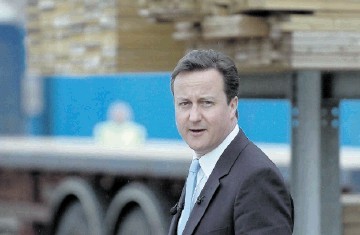
The UK election has delivered an unexpected outcome, with Conservative Prime Minister David Cameron on course to stay in 10 Downing Street with a parliamentary majority.
That’s partly because the Tories defeated Liberal Democrat lawmakers in England. In Scotland, where Ed Miliband’s Labour opposition has been dominant for a generation, the Scottish National Party is set to win nearly all 59 House of Commons seats.
Vince Cable, the Liberal Democrat Business Secretary, lost the Twickenham district in southwest London he held since 1997. Tania Mathias, the Tory candidate, overcame a 12,140 majority to defeat Cable in one of the Liberal Democrats’ safest seats.
“The fact is that we were hit by a very well organized national campaign based on people’s fear of a Labour government and the Scottish nationalists,” said Cable, 71. “Unfortunately this has been a terrible night for our party all over.”
The Liberal Democrat chief secretary to the Treasury, Danny Alexander, 42, also lost his bid to remain in Parliament, to the Scottish National Party, as his party sustained heavy losses in Scotland.
Alexander, who helped lead the Liberal Democrats into government for the first time since World War II and was one of the architects of the “No” campaign to stop Scotland splitting from the UK last year, had represented Inverness, Nairn, Badenoch and Strathspey in the Scottish highlands for 10 years.
Scottish Labour leader Jim Murphy, 47, who also played a leading role in the the victorious campaign against Scottish independence, lost his seat.
His district of East Renfrewshire, south of Glasgow, which he’d represented since 1997, fell to the SNP, which came fourth in 2010. He said he’d continue to lead Scottish Labour.
“This of course is an enormous moment for the SNP and no one can deny that,” Murphy said after being defeated. “With a victory of this scale also comes responsibility.”
Douglas Alexander, Labour’s spokesman on foreign affairs, also lost his seat to the SNP.
The SNP’s Mhairi Black, a 20-year-old politics student, overturned one of the largest majorities of any UK district won by Labour in 2010 to take the Paisley and South Renfrewshire seat. Alexander, 47, one of the most senior members of the Labour Party and its chief election strategist, had held the district for 18 years.
George Galloway lost his seat in northern England to Labour, his former party. Galloway, 60, has represented Bradford West for his anti-war Respect Party since a special election in 2012. He lost the district by more than 11,000 votes to Labour’s Naz Shah.
Galloway’s stewardship of the district has been controversial. He declared Bradford, which has a high Muslim population, an “Israel-free zone” last year.
Galloway was expelled from Labour in 2003 over his opposition to the Iraq War. With debating skills honed on the floor of the House of Commons, in 2005 he saw off accusations from the U.S. Senate Committee on Homeland Security and Governmental Affairs Permanent Subcommittee on Investigations that he had been given the right to buy oil from Iraq in return for his support for Saddam Hussein.
Ed Davey, energy minister in the UK government, added to the list of Liberal Democrat casualties.
Davey, 49, lost his southwest London seat of Kingston and Surbiton to the Conservatives. The Liberal Democrats are forecast to lose all but 12 of their 57 House of Commons seats, according to a BBC forecast.
Liberal Democrat Simon Hughes lost his Bermondsey and Old Southwark seat in south London, which he has held since 1983, to Labour. He had an 8,530-majority overturned.
“The Liberal Democrats are proud of what we’ve done, we’re going to be in the next Parliament, we’re not going away,” Hughes, 63, said in an interview on Sky News before his result was declared.
Former Liberal Democrat leader Charles Kennedy, who first won his Ross, Skye and Lochaber seat in northwest Scotland as a 23-year-old in 1983, also lost.
The SNP’s Ian Blackford defeated Kennedy by 5,124 votes in the rural Highlands district. Kennedy had a majority of 13,070 over Labour in the 2010 election, when the SNP came third.
Esther McVey, the Tory employment minister, is one of the few high-profile Tories to lose her seat, Wirral West in northwest England. She lost to Labour by just 417 votes.
Recommended for you
